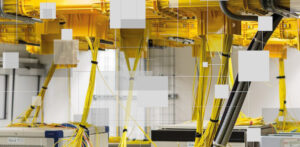- Significant increase in energy efficiency: 12 times lower energy consumption per GB of data transmitted in data centres compared to 2010
- Constantly decreasing CO2 emissions (30% less by 2030) despite increasing demands on computing power
- Global energy efficiency potential through cloud computing not yet exhausted
Berlin, 17 August 2020 – Data centres are the backbone of the digital transformation of business and society in Germany, Europe and worldwide. As part of the digital infrastructure ecosystem, they are at the same time the guarantor of ecologically sustainable digitalisation in Europe and can make their contribution to achieving the climate goals.
While the demand for computing power has increased tenfold over the past 10 years due to the ongoing digitalisation of the economy and society, the power demand per gigabit in data centres is 12 times lower today than in 2010. At the same time, CO2 emissions from data centres are falling across Europe. By 2030, CO2 emissions are expected to reduce by 30 percent. These are the findings of Part I of a study by the Borderstep Institute, commissioned by the eco Association on behalf of the Alliance for the Strengthening of Digital Infrastructures in Germany, and supported by the Vodafone Institute.
“Digitalisation is forging ahead in business, administration and society, and with it so too are the demands on computing power in data centres. This development is causing a moderate increase in energy consumption. It does not mean, however, that the CO2 emissions of data centres in Europe have also been skyrocketing. On the contrary, they have been declining for years,” says Klaus Landefeld, Vice Chair of the eco Board and Director of Infrastructure and Networks at the eco Association.
Data centres are becoming more climate-friendly: CO2 emissions to fall by 30 percent by 2030
An important lever for a better ecological balance is the reduction of CO2 emissions.
As the eco/Alliance study shows, the industry is already on the right track. Since 2015, CO2 emissions caused by the energy consumption of data centres throughout Europe have been declining. For Germany, however, the forecasts assume that CO2 emissions from power generation will fall more slowly than other parts of Europe over the next decade. This is mainly due to the fact that, under current legislation, the phase-out of power generation from coal energy can continue until 2038. In 2019, the share of lignite and hard coal in Germany’s electricity generation mix was around 33 percent. However, by 2030, emissions will also fall in Western Europe, so that a 30 percent reduction in greenhouse gas emissions can be expected for the whole of Europe.
A faster, politically controlled phase-out of coal in Germany could, however, lead to a much greater reduction in CO2 emissions from data centres in Western Europe.
Many data centre operators are already improving their CO2 balance today by increasing power generation with renewable energies. As early as 2017, 30 percent of operators in Germany stated that they exclusively use electricity from renewable sources for their data centres. This can be done by purchasing green power from an electricity supplier or through the (local) operation of the data centre’s own renewable-energy power generation plant. A good alternative here would also be power purchase agreements (PPAs), which enable electricity to be purchased directly from renewable energy plant operators. PPAs have the potential to massively accelerate the energy transition with the right framework conditions.
For an overall view of the CO2 balance of data centres, it must also be taken into account that digital technologies have the potential to save considerably more greenhouse gas emissions in the future than their operation causes. These potentials can be three to ten times higher than the emissions directly caused by the operation of digital devices and infrastructures.
“In many ways, data centres are a driver of innovation for a sustainable economy and the guarantor for sustainable digitalisation in Europe. We are currently seeing this especially in the light of the Corona crisis, where digital infrastructures act as drivers of innovation, for example in the areas of transport and home office applications,” says Béla Waldhauser, Spokesperson for the Alliance for the Strengthening of Digital Infrastructures in Germany, which was founded in 2017 under the umbrella of eco.
“A sustainable ecological transformation of our society will not be possible without digitalisation,” adds Inger Paus, Managing Director of the Vodafone Institute and Chair of the Management Board of the Vodafone Foundation Germany. A majority of Europeans are also convinced of this, as the latest surveys by the Vodafone Institute have confirmed. “In the public debate, however, the sustainability of digital technologies is usually focused on energy consumption rather than on the potential for avoiding CO2 emissions. The study not only shows that data centres are continuously improving their eco-balance, but also that they are an essential part of the solution as the backbone of digitisation,” Paus continues.
High efficiency potentials through cloud computing not exhausted
The growing importance of cloud computing also offers further efficiency potential. Benefits such as flexibility, scalability, low administration, and no investment costs mean that more and more organisations are choosing to use cloud technologies and can reduce their energy consumption by up to 84 percent. However, as the study shows, Europe lags behind other parts of the world in the use of cloud services in enterprises. On average, only 26 percent of EU companies used paid cloud services in 2018.
Part II of the study on the sustainability potentials of data centres will be published in late 2020 and, in addition to the energy efficiency potentials in the area of energy consumption and emissions, will also examine concrete case studies for energy and resource efficient data centres in Europe, as well as opportunities and challenges that can arise from regulatory frameworks and heat recovery in data centres.




